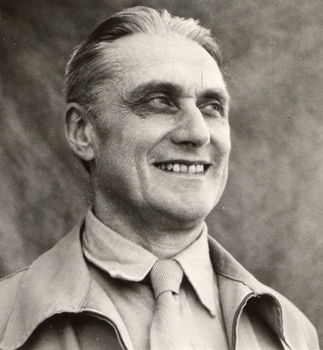Quoted in: "Ragnar Frisch." The Concise Encyclopedia of Economics. 2008. Library of Economics and Liberty. 1 June 2014.
1970s and later
Works
Famous Ragnar Frisch Quotes
Source: 1930s, Propagation problems and impulse problems in dynamic economics, 1933, p. 197
Ragnar Frisch (1926); Quoted in: " Ragnar Frisch 1895-1995 https://www.ssb.no/a/histstat/doc/doc_199403.pdf." O. Bjerkholt, 1994.
1920
Ragnar Frisch in the first issue of Econometrica in 1933; Quoted in: United States. Bureau of Agricultural Economics. Library (1941) Agricultural economics literature, p. 705
1930s
Context: Econometrics is by no means the same as economic statistics. Nor is it identical with what we call general economic theory, although a considerable portion of this theory has a definitely quantitative character. Nor should econometrics be taken as synonymous with the application of mathematics to economics. Experience has shown that each of these three view-points, that of statistics, economic theory, and mathematics, is a necessary, but not by itself a sufficient, condition for a real understanding of the quantitative relations in modern economic life. It is the unification of all three that is powerful. And it is this unification that constitutes econometrics.
Source: 1930s, Propagation problems and impulse problems in dynamic economics, 1933, p. 1
Ragnar Frisch (1970) "Econometrics in the World of Today." University of Oslo, Institute of Economics, 1971; As quoted in Robert Johnston, Graham Clark. Service Operations Management: Improving Service Delivery. Pearson Education, 2005. p. 347
1970s and later
Ragnar Frisch Quotes about problems
Frisch (1927). as quoted in: Bjerkholt, Olav, and Duo Qin. A Dynamic Approach to Economic Theory: The Yale Lectures of Ragnar Frisch. Routledge, 2010: About "Oekonometrika"
1920
Source: 1970s and later, From Utopian Theory to Practical Applications, 1970, p. 10
Source: 1930s, Propagation problems and impulse problems in dynamic economics, 1933, p. 1
Frisch (1932) New Methods of Measuring Marginal Utility. Mohr, Tübingen. p. 2-3: Quoted in: Dagsvik, John K., Steinar Strøm, and Zhiyang Jia. " A stochastic model for the utility of income http://www.ssb.no/a/publikasjoner/pdf/DP/dp358.pdf." (2003).
1930s
etc.
Source: 1970s and later, From Utopian Theory to Practical Applications, 1970, p. 29
R. Frisch (1964), Theory of Production, p. v: Lead paragraph of preface
1940-60s
Context: In this feverish world of ours, where one wants the economic analyses to produce easily understandable results quickly and at the least possible cost, some of us have fallen into the habit of assuming for simplicity that the hundreds sometimes thousands of variables that enter into the analyses are linked together by very simple relationships. Frequently we even go so far as to assume linear relationships. Only in this way have we been able to feed our problems into the electronic computers and get mechanical answers quickly and at low cost.
Ragnar Frisch Quotes about studying
Frisch (1952) " Frish on Wicksell http://www.sv.uio.no/econ/om/tall-og-fakta/nobelprisvinnere/ragnar-frisch/published-scientific-work/Scan1.pdf" p. 654
1940-60s
Accordingly, the quantitative study of economic phenomena here considered may be termed econometrics.
Frisch (1927) as quoted in Divisia 1953, pp.24-25; Cited in: Bjerkholt, Olav. " Ragnar Frisch and the foundation of the Econometric Society and Econometrica http://www.ssb.no/a/histstat/doc/doc_199509.pdf." ECONOMETRIC SOCIETY MONOGRAPHS 31 (1998): 26-57.
Lead paragraph of a memorandum on the importance of establishing the journal "Oekonometrika"
1920
Ragnar Frisch, " A method of decomposing an empirical series into its cyclical and progressive components http://www.sv.uio.no/econ/om/tall-og-fakta/nobelprisvinnere/ragnar-frisch/published-scientific-work/rf-published-scientific-works/rf1931e.pdf." Journal of the American Statistical Association 26.173A (1931): 73-78.
1930s
Source: 1930s, Propagation problems and impulse problems in dynamic economics, 1933, p. 2
Ragnar Frisch Quotes
Source: 1930s, Propagation problems and impulse problems in dynamic economics, 1933, p. 1
Frisch, (1946, p. 1), as quoted in: " Ragnar Frisch 1895-1995 https://www.ssb.no/a/histstat/doc/doc_199403.pdf." O. Bjerkholt, 1994.
1940-60s
Source: 1970s and later, From Utopian Theory to Practical Applications, 1970, p. 9 : Lead paragraph
Ragnar Frisch. " A complete scheme for computing all direct and cross demand elasticities in a model with many sectors http://econ.ucdenver.edu/beckman/Research/readings/frisch-demand-econometrica.pdf." Econometrica 27.2 (1959): 177-196.
1940-60s
Source: 1930s, Propagation problems and impulse problems in dynamic economics, 1933, p. 33
Frisch, (1947); Quoted in: Steinar Strøm (1998) Econometrics and Economic Theory in the 20th Century. p. 542
1940-60s
Source: 1930s, Propagation problems and impulse problems in dynamic economics, 1933, p. 173
Source: 1930s, Propagation problems and impulse problems in dynamic economics, 1933, p. 173
Ragnar Frisch. " A complete scheme for computing all direct and cross demand elasticities in a model with many sectors http://econ.ucdenver.edu/beckman/Research/readings/frisch-demand-econometrica.pdf." Econometrica 27.2 (1959), p. 178; Cited in: Chipman, John S. " http://www.sv.uio.no/econ/om/tall-og-fakta/nobelprisvinnere/ragnar-frisch/Chipman%20paper[1.pdf The contributions of Ragnar Frisch to economics and econometrics]." ECONOMETRIC SOCIETY MONOGRAPHS 31 (1998): 58-110.
1940-60s
Ragnar Frisch (1926) "On a Problem in Pure Economics: Translated by JS Chipman." Preferences, Utility, and Demand: A Minnesota Symposium. 1926."
Original in French:
Intermediaire entre les mathematiques, la statistique et l'economie politique, nous trouvons une discipline nouvelle que ion peut, faute de mieux, designer sous le nom de reconometrie. L'econometrie se pose le but de soumettre les lois abstraites de l'economie politique theorique ou l'economie 'pure' A une verification experimentale et numeriques, et ainsi de constituer, autant que cela est possible, l'economie pure en une science dans le sens restreint de ce mot.
1920

